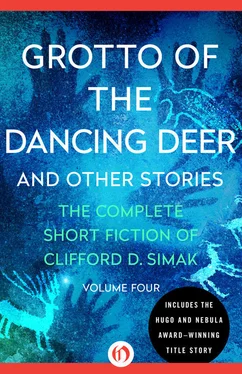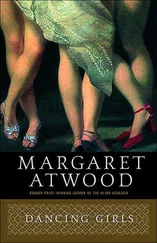“We’d ought to have some ‘taters pretty soon, Mary,” he said, striving to keep a tremble out of his voice. “I was looking at them today. Planted them in that sandy patch and the water drained off pretty good. They’ll taste fine.”
He heard soft sobs and saw that his wife was weeping.
“What’s the matter, Mary?” he asked. “Dog-gone, what are you crying for?”
“It’s the chickens, Zeke,” she told him. “I set such stock by them hens of mine. And now they’re all gone. We won’t have no more eggs.”
Zeke cursed.
“Next time I see a skink,” he said, “I’m going to catch him alive and dunk him into one of them acid pools over there by the river.”
Roughly he patted his wife’s shoulder.
“I’ll sure fix them for what they done to our chickens,” he said.
A thrumming roar sounded over the horizon and Zeke looked up quickly. The roar became louder and louder. With tubes red-hot, a flier swept over the edge of the jungle, dipped toward the ground with forward rockets blasting.
Zeke leaped to his feet, waving his arms, cursing.
“Keep out of my ‘tater patch, damn you!” he screamed. “I’ll sure for certain take the hide off you if you bust up my ‘tater patch.”
The ship plunged downward, too fast for a safe landing. Its nose struck the potato patch, ripping into the soft soil, throwing it aside in great furrows like the mold-board of a giant plow.
“Now you done it, damn it, now you done it,” shrieked Zeke. “You ruined my ‘tater crop!”
He raced swiftly through the waist-high patches of polka-dot weeds that lay between the cabin and the potato patch.
The ship’s nose was buried deep in the cushioning earth, but it did not appear to be damaged. As Zeke approached, the cabin door opened and a man staggered out.
At the sight of Zeke he cried out, a piteous, animal-like cry. “Food, for the love of Heaven—food!” he cried. “I’m starving!”
In the light which flooded from the cabin door Zeke saw the man’s face and his anger turned swiftly to pity. He saw an old man, his form emaciated, his face pinched, eyes staring out of deep hollows, his cheeks sunken—a living skeleton.
The man took a step forward, staggered and fell. Zeke scooped him up and galloped for the house.
“Mary,” he yelled. “Get some food. This man is nearly starved.”
A voice sounded out of the gloom. It was Luther, on his way over to spend a few hours with his friend.
“What’s the matter, Zeke?”
“Plane crashed,” Zeke yelled. “Better run to town and get Doc. There’s some other fellers in there. They look bad hurt.”
“Be back in a minute with Doc if he’s sober,” Luther yelled back.
Zeke heard his feet pounding rapidly down the road.
“Zeke,” Mary’s voice was on the verge of despair, “I ain’t got nothing but a mess of greens. That ain’t fitten food for a sick man.”
“It’s better than nothing,” said Zeke. “Give me a dish of it. This feller’s starved, I tell you.”
IV
“About all you can say for New Chicago is that nobody bothers you much here,” Doc told Bob. “Right good place for a man to hide out if he’s got something he don’t want known.
“Take the feller who runs the Venus Flower saloon. He was a big racketeer back in Old Chicago on Earth. Came here three or four years ago. Then Angus MacDonald, you seen him this afternoon. His real name isn’t Angus MacDonald. Folks say he was one of the pirates that raised so much hell on the Earth-Mars run years ago. Then there’s old Hank Smith. Nice old feller. But he’s the head of a utility company that went haywire back on Earth. Lots of investors would like to get their fingers on him.”
“How about yourself, Doc?” asked Bob. “No skeletons rattling around in your closet, is there?”
“Hell, no,” said Doc. “I was just a damn fool who came out here to grow up with the country.”
Doc patted the bottle that stood on the desk.
“You certainly are a proper judge of liquor,” he said. “First time I had anything like this for years.”
He tilted the bottle and it gurgled pleasantly.
A rattle of footsteps sounded on the stairs.
Luther Bidwell stormed into the room. “Doc,” he shouted, “a plane just crashed out in Zeke Brown’s potato patch. Some of the fellers are in bad shape.”
Doc reached for his raincoat. “Business picking up today,” he commented. “Two calls in a few hours.”
He slipped the bottle into his coat pocket.
With Luther in the lead, the three men raced down the stairs and out into the street. The weather had cleared to some extent, but the street was one vast mud-hole.
Running, they took the road to Zeke’s house, a little over a mile distant.
Zeke greeted them at the doorway. “Hated to bother you, Doc,” he said, “but didn’t know how bad it was. Starving man and four dead men in the plane. Looks like they died from starvation. Old men, white hair and every one of them just skin and bones. The feller I brought here was pretty bad off when I picked him up, but Mary fed him up and he seems all right now.”
“Starving,” asked Doc. “Do you mean they look like they died because of lack of food?”
“Sure do,” Zeke affirmed.
Bob shoved the farmer to one side and ducked into the cabin. He made out the figure of a man lying on the bed. With one stride he was across the room and bending over the man.
“Were you the man in the plane?” he asked.
“Yes, I was,” the flier replied. “This farmer tells me all the others died.”
“Did you have the Hunger Disease?” demanded Bob.
“I guess so,” the man answered weakly. “We were at a post on the Pearl River. Heard about it over the radio and figured we were lucky to be out of touch with everyone. Thought we were safe. But it hit us day before yesterday. We started for Radium City, thinking we might find help there.”
“How do you feel now?” asked Bob.
The man ran a skeletonlike hand over his stomach, pressed and punched his midriff.
“Pain’s all gone,” he announced. “Feel fine. Not hungry any more. First time I haven’t been hungry for two days. Before this it didn’t matter how much I ate, I was always hungry.”
“Did you eat much here?”
“No, just a dish of greens of some sort. Seemed to fill me up right away and gave me a lot of strength. Still pretty weak, but I feel different. Feel like myself again. Not sick any longer. Feel like I’m going to get well.”
Bob rose and turned around. “Zeke,” he asked, “what did you feed this man?”
Mary Brown answered the question. “All I had was some greens. I was so ashamed, but Zeke said they was better than nothing.”
“Mrs. Brown,” asked Bob, “what were those greens made out of?”
“Why,” she said, “polka-dot weeds. They make fine greens.”
“Doc,” Bob shouted.
Doc waddled across the room.
“Listen to me,” said Bob, taking hold of the slack at the throat of Doc’s raincoat. “Does everyone in New Chicago eat greens made out of the polka-dot weed?”
Doc squirmed. “Why, I guess so,” he said. “Everybody likes it. Me, I eat all I can get of them.”
“Does Susan Donagan eat it? Does she like it?”
“No,” said Doc, “come to think of it, she doesn’t. Doesn’t like anything green. Her mother frets a lot because she won’t touch spinach.”
“Doc,” said Bob, “listen to me and do what I tell you. Try to get that old alcohol-fogged brain of yours to working. You get down to Donagan’s as fast as you can. Feed Susan polka-dot greens. Hold her and cram them down her throat if you have to. And then watch. If she gets well, I’ll make you famous. I’ll write your name in 72 point type and put your mug on every front page in the System.”
Читать дальше












